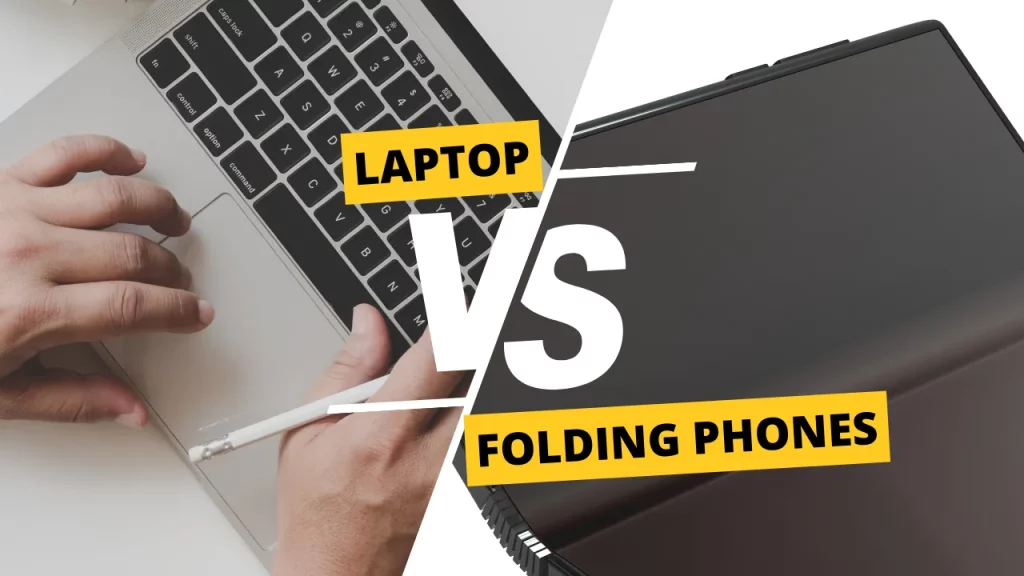Folding phones, also known as foldable smartphones, represent a groundbreaking leap in mobile device design. These devices feature flexible displays that can be folded, allowing for a compact form factor while offering a larger screen of real estate when unfolding. The concept of a folding phone originated as a response to the increasing demand for larger screens without sacrificing portability.

With the recent rising of folding phones, many are questioning if these new devices can replace the traditional laptop. While there are certainly benefits to having a phone that can fold into a smaller device, there are also limitations that must be considered.
In this article, we will delve into the intricacies of this debate and explore the potential of folding phones as a viable alternative to traditional laptops.
Folding Phones vs Laptops
Portability vs. Productivity
One of the primary advantages of folding phones liek Galaxy Fold4 or Moto Razr 40 Ultra is their unparalleled portability. These devices can effortlessly fit into a pocket or a small bag, making them ideal for individuals constantly on the move. Their compact size allows for easy transportation, eliminating the need for bulky laptop bags or backpacks. Moreover, the ability to fold and unfold the screen provides users with the flexibility to switch between phone and tablet modes, adapting to different usage scenarios.
However, portability alone does not determine the suitability of folding phones as laptop replacements. Laptops have long been the preferred choice for productivity due to their larger screens, physical keyboards, and robust computing capabilities. Tasks such as content creation, graphic design, programming, and data analysis often require a spacious workspace and the ability to multitask seamlessly. While folding phones have made significant strides in screen size, they still fall short in comparison to laptops in terms of providing a comfortable and efficient work environment.
Software and App Ecosystem
Another critical aspect to consider is the software and app ecosystem. Laptops, especially those running full-fledged operating systems like Windows or macOS, offer a wide range of applications and software tools tailored for professional use. These platforms have a long-established presence in various industries, with a vast selection of software options available to cater to specific needs.
In contrast, folding phones typically run mobile operating systems such as Android. Although these platforms have extensive app stores with millions of applications, the availability of specialized software for professional tasks might be limited.
While mobile apps have improved significantly over the years, they often lack the advanced features and capabilities found in desktop software. This limitation can hinder the seamless transition from a laptop to a folding phone for individuals reliant on industry-specific tools and software.
User Experience and Adaptability
The user experience is a critical factor in determining the viability of folding phones as laptop replacements. Laptops offer a familiar interface with a keyboard, trackpad, and a robust operating system that supports multitasking. These features contribute to a smooth and efficient workflow, allowing users to navigate through complex tasks with ease.
Folding phones, on the other hand, require users to adapt to a different form factor and interaction paradigm. While touchscreens have become ubiquitous, the absence of a physical keyboard and trackpad can pose challenges for certain tasks. Text input, precision editing, and extended periods of work may be less comfortable on a folding phone compared to a laptop.
So, Can a Folding Phone Replace a Laptop?
While these phones offer a larger display than traditional smartphones, they are not yet capable of replacing laptops. However, they can certainly replace Android tablets or iPads.
With their larger screens and more powerful processors, folding phones offer a more versatile and efficient option for browsing the web, streaming media, or even doing some light work on the go.
As technology continues to advance, it’s possible that folding phones may eventually be able to replace laptops as well. But for now, they are best suited for those who want a more portable and convenient alternative to tablets.